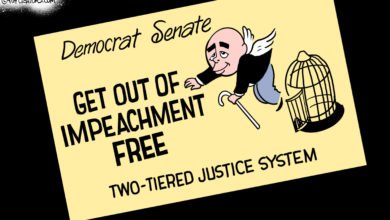Orrin Hatch: Conservative or RINO?
Early in the spring of 1976 I attended a backyard picnic at the home of my mother’s cousin, Desmond (Des) J. Barker. Barker was a successful advertising executive and was currently running as a Republican for a U.S. Senate seat from Utah. He wasn’t exactly a newcomer to politics. In 1971 he was appointed Special Assistant to President Richard M. Nixon for Domestic Communications Liaison. During his time in the White House Barker served as Charles W. Colson’s deputy on the President’s personal staff. Those of you old enough to remember the Watergate scandal will certainly recall Colson. When Barker began to understand what was happening in the White House under Nixon’s influence he abruptly quit his post in January of 1973 and returned home to his advertising and public relations firm in Salt Lake City. A couple of years later he decided to get back into politics as an elected official instead of as a bureaucratic functionary. Barker told all the extended family members gathered there for that celebratory picnic that he was confident he was the front-runner among the Republicans and given that Utah was solidly conservative he firmly believed that he was going to win the GOP nomination and would be elected. We all happily munched on hotdogs and potato chips with visions of being related to the next U.S. Senator from Utah swimming around in our craniums. “More potato salad, PolarCoug?” asked Barker. “Why thank you, Senator-to-be mom’s cousin,” I answered. “Just plop it right down there next to the plankton and kelp kabobs.” Burp! <PolarCoug and Barker did the happy dance together.>
Then Orrin Hatch happened. Hatch came out of nowhere and thumped Barker and all the other conservative candidates for that senate nomination.  Utah has been stuck with Hatch ever since. For the past 35 years Hatch has ruled the roost from his perch as a sitting U.S. Senator. But times they are a changin’ and in this election cycle Hatch appears vulnerable. Hatch’s conservative credentials are being challenged. In an article published in the Salt Lake Tribune on March 6, 2011 The Salt Lake Tribune’s Matt Canham offered up a stark analysis of Hatch’s image problem with conservatives. “Hatch is well aware that he has a tea party problem,” wrote Canham. Hatch would be blind not to see the same freight train that derailed Des Barker is now running him down on the very same track. Once again, a candidate has arisen from nowhere and is presenting a formidable challenge to the once-presumed frontrunner for a senate seat in Utah. Conservative Congressman Jason Chafitz has not yet announced his candidacy for Hatch’s senate seat but it is considered quite likely that it is only a matter of time. Hatch better be worried because the tea party upending a Utah senator is not without precedence. Last year Senator Bob Bennett was summarily dismissed by the tea party and he didn’t even manage to make it out of the GOP Utah State Convention. Gonzo. Done. Finished. Kaput. Hatch sees the handwriting on the wall and he is running scared.
Utah has been stuck with Hatch ever since. For the past 35 years Hatch has ruled the roost from his perch as a sitting U.S. Senator. But times they are a changin’ and in this election cycle Hatch appears vulnerable. Hatch’s conservative credentials are being challenged. In an article published in the Salt Lake Tribune on March 6, 2011 The Salt Lake Tribune’s Matt Canham offered up a stark analysis of Hatch’s image problem with conservatives. “Hatch is well aware that he has a tea party problem,” wrote Canham. Hatch would be blind not to see the same freight train that derailed Des Barker is now running him down on the very same track. Once again, a candidate has arisen from nowhere and is presenting a formidable challenge to the once-presumed frontrunner for a senate seat in Utah. Conservative Congressman Jason Chafitz has not yet announced his candidacy for Hatch’s senate seat but it is considered quite likely that it is only a matter of time. Hatch better be worried because the tea party upending a Utah senator is not without precedence. Last year Senator Bob Bennett was summarily dismissed by the tea party and he didn’t even manage to make it out of the GOP Utah State Convention. Gonzo. Done. Finished. Kaput. Hatch sees the handwriting on the wall and he is running scared.
Despite his protests to the contrary, Hatch isn’t exactly a true-blue through and through, dyed-in-the-wool conservative. Some of his votes have been downright scary. Last year, for example, Hatch voted in unison with Bennett to approve the appointment of Cass Sunstein as Regulatory Czar – a position formally known as the Director of the White House Office of Information and Regulatory Affairs (OIRA). In case you aren’t aware of Sunstein’s liberal mindset just educate yourself with the following two quotes from Sunstein:
In what sense is the money in our pockets and bank accounts fully ‘ours’? Did we earn it by our own autonomous efforts? Could we have inherited it without the assistance of probate courts? Do we save it without the support of bank regulators? Could we spend it if there were no public officials to coordinate the efforts and pool the resources of the community in which we live? Without taxes, there would be no liberty. Without taxes there would be no property. Without taxes, few of us would have any assets worth defending. [It is] a dim fiction that some people enjoy and exercise their rights without placing any burden whatsoever on the public… There is no liberty without dependency.
Did you get the “dependency” thing at the end? That’s Sunstein’s way of saying that we are dependent upon the government to manage our finances. Think redistribution of wealth. Sunstein’s goal is to control every aspect of our lives, including our money. Now isn’t that nice and kind of him? Didn’t think so. And now the second Sunstein quote:
If government could not intervene effectively, none of the individual rights to which Americans have become accustomed could be reliably protected. […] This is why the overused distinction between “negative” and “positive” rights makes little sense. Rights to private property, freedom of speech, immunity from police abuse, contractual liberty and free exercise of religion—just as much as rights to Social Security, Medicare and food stamps—are taxpayer-funded and government-managed social services designed to improve collective and individual well-being.
And Hatch voted for this guy? Unbelievable! Actually it is believable. Hatch has a record of voting for liberal/progressive issues. This proclivity to release his inner liberal Ted Kraken Kennedy has got him in deep you-know-what with conservatives. Consider this quote from a February 17, 2011 story written by Daniel Sayani that was published in the NewAmerican.
Senator Orrin Hatch (R-Utah) is under scrutiny from fiscal conservatives following his address at the Conservative Political Action Conference (CPAC) on Friday, when he defended his big government, big spending voting record in the Senate, including his vote for the “bailout,” the Troubled Assets Relief Program (TARP), the unconstitutional, ill-fated, taxpayer-funded, government-led nationalization and bailout of the assets and equity of several failed financial institutions in the wake of the subprime mortgage crisis in 2008.
Hatch’s unpopular explanation of his vote for TARP resulted in heckling, hollering, and clamor from the CPAC audience, which soundly rejected any of his attempted justifications for the unconstitutional legislation, which has only served to increase the national deficit and to lead the further advance towards a corporatist society in which big government and big business become fused together, as the boundaries between the two are eroded through federal legislation, such as the bailout and stimulus.
I have to admit that I am not totally impartial in the matter of Hatch. I’ve had personal experience with his politics. Thirty years ago I was a newspaper reporter in Utah. I covered a lot of issues involving Hatch. I fondly remember one story I was involved with – the saga of the Central Utah Water Project (CUP).
The CUP was established in 1964 with the stated goal of diverting water from the Colorado River and delivering it to Salt Lake City and the region roundabout. It sounds simple enough doesn’t it! Well, in theory it is simple. In reality it is a boondoggle. Over the years it has become a bottomless pit into which the U.S. Government has poured vast amounts of money. If you know anything about the geography of the State of Utah you will realize that there are a multitude of natural and political barriers between Salt Lake City and the water in the Colorado River. You know things like mountains, canyons, subdivisions, Robert Redford, and competing special interests for the aforementioned water. Let me tell you – I never saw such a catfight. I used to attend board meetings of the Central Utah Water Conservancy District (CUWCD) in my capacity as a news reporter. Talk about political intrigue! I interviewed mayors, chairmen of municipal planning commissions, the governor (at that time it was Scott Matheson), various lawyers, and corporate executives. Why corporate executives? Well, you see, in eastern Utah, where the Colorado River just happens to flow, is an awful lot of oil and oil shale. Think gasoline and natural gas. Eastern Utah is chock full of the stuff. And not far from the oil and gas is a huge amount of coal. Eastern and Central Utah is an energy producing gold mine. And there is a funny thing about mining operations. I’ll tell you a little secret. Shhhh, don’t let anyone you know I told you this…it’s a secret just between you and me. Can you keep a secret? Good! Okay, here goes – you see, mining operations and power plants and other major industrial operations tend to require a lot of water. And in case you don’t remember, Utah is sitting right on top of a desert. Water is in short supply. So whoever controls the water controls a great deal of political power in the State of Utah.
Now at the time I was a newspaper reporter the State of Utah, municipal governments and local business interests were trying to gain legal rights to more of that water. They were pitted against the federal government and large industrial national and multinational companies – More on those companies in just a minute.
The funny thing about Hatch was that despite the fact that Utah’s local and state politicians were all united in their efforts to manage their own destiny by controlling as much of the proposed water supply as possible, Hatch didn’t join the fight on their side. In fact, Hatch took up the side of the federal government. Wasn’t Hatch a senator from the State of Utah? Wasn’t it his job to represent the State of Utah? Something fishy was going on and the other news reporters and I were intent on figuring out what was going on with Hatch and his complete rejection of state’s rights.
Solving part of the riddle involved a mainframe computer at Brigham Young University. This was back in the days before PCs. Well, there were such things as the Osbourne and the Trash 80. You old-timers like me will smile at the quaintness of those machines. But from a PC perspective that was all we had. The big computing jobs were accomplished via mini computers such as Digital Equipment Corporation’s PDP-8s and PDP-11s and even larger mainframe computers made by IBM. My news organization contacted a professor of Computer Science at Brigham Young University and we supplied him with a list of all of Hatch’s campaign donations from his 1976 campaign. The professor did his magic and eventually the mainframe-attached printer spit out a map of the United States. It wasn’t just any old map. This map was special. It showed the relative size of each state according to the dollar percentage of political donations made to Hatch during the campaign. Naturally you would expect that the State of Utah would be larger than any other state. But that was not the case. It turned out that the Commonwealth of Pennsylvania was the source of the bulk of Hatch’s campaign funding. Pennsylvania came out huge on that map. Yeah, we printed that map on the front page of the newspaper. You should have seen the reaction from the Hatch camp. I wish I could have been a fly on the wall over at Hatch’s offices when they saw that map. It wasn’t exactly good public relations for them.
Now why would donors from the Commonwealth of Pennsylvania supply such a large percentage of Hatch’s total campaign contributions? Oh, and why were there major companies operating in Eastern Utah’s oil, oil shale, and coal country that had offices, if not headquarters in, you guessed it, Pennsylvania? Gee, and didn’t Hatch previously work as an attorney in Pittsburgh? Why, yes he did! I think you get the picture of what was going on. We certainly figured it out back in the newsroom.
A common tactic used by news reporters is to publish just some of what they know in hopes that dribbling out the information will shake loose additional information. That was what we did. We did weekly stories on the CUP controversy. We didn’t tell everything that we knew – we knew that by releasing information bit by bit that new sources would come forward and fill in missing pieces of the puzzle. So off we went, dribbling out the map, the disclosure that Hatch had previous business dealings within Pennsylvania, and so on, and so forth. Oh the stories I could tell about our scheming behind the scenes. It was an amazing time in my life and 30 years later I still laugh at what we knew but never shared publicly.
I had a tendency to tell my father about what I was working on in my efforts to develop news stories. So Dad was quite informed as to the ongoing saga of the Hatch/CUP controversy. Dad also happened to be a Republican precinct chairman. Dad got outraged by what I told him about Hatch’s lack of support for state rights. He got so mad that he went public with his opposition to Hatch. In fact, Dad, a staunch conservative, was so angry with Hatch that he publicly announced his support for Hatch’s Democratic opponent, Ted Wilson. Hatch’s camp decided enough was enough and dispatched a staff member, Holly Hicks, to put out the fire at the PolarCoug Sr. residence. The only problem for Hicks was that she didn’t connect Dad PolarCoug’s name with his son and newspaper reporter, PolarCoug.
Hicks knocked on Dad’s front door. Dad went to the door and opened it. There was Hicks, standing in the middle of Dad’s porch with a stern look on her face. “I understand there is a problem at this house,” Hicks told my Dad. Dad stared right back at her and said “The problem is standing on my porch.” Right on, Dad! Meanwhile, my little sister ran downstairs and notified me of the confrontation between Hicks and Dad PolarCoug. I scrambled up the stairs, went to the door and stood beside my father. Hicks, upon recognizing me as her public relations nightmare, looked like she wished she was anywhere but on our porch at that moment of her little political activist life. Oops! Neurons fired, synapses were jumped, and Hicks finally made the name connection between two generations of PolarCougs. As Steve Martin once famously said, “Comedy isn’t always pretty.” Hicks fled the scene having failed in her attempt to put out the fire of a rebellious precinct chairman. Now she had a bigger problem. Me. Giggles!
The details escape me at this point but I seem to remember that after telling my story back in the newsroom and everybody splitting their sides at the tale of Hicks on the porch, we decided to take it easy on Hicks. So I believe we never did publish the story I just told you – much to Hicks’ relief, I’m sure!
Anyway, the whole point of telling you this story is to let you know that Hatch has a long history of not being a true-blue conservative. He perpetuates the myth that he is a conservative but it is just that – a myth. And his true convictions have become general knowledge with members of Utah’s tea party. Hatch is in political trouble back home. He is the epitome of the establishment Republican. He is not a member of the grass roots conservative movement, once again, despite his protests to the contrary. Hatch is in for the fight of his political life in the coming election cycle. Whether it is Chafitz or another candidate that comes out of the woodwork to challenge him, Hatch could very easily lose.
I’m sure that somewhere Desmond J. Barker is enjoying every minute of it. What goes around, comes around, Senator Orrin Hatch. You’ve had your 15 minutes of fame. Time’s up. You are not the droid we are looking for. Move along.




